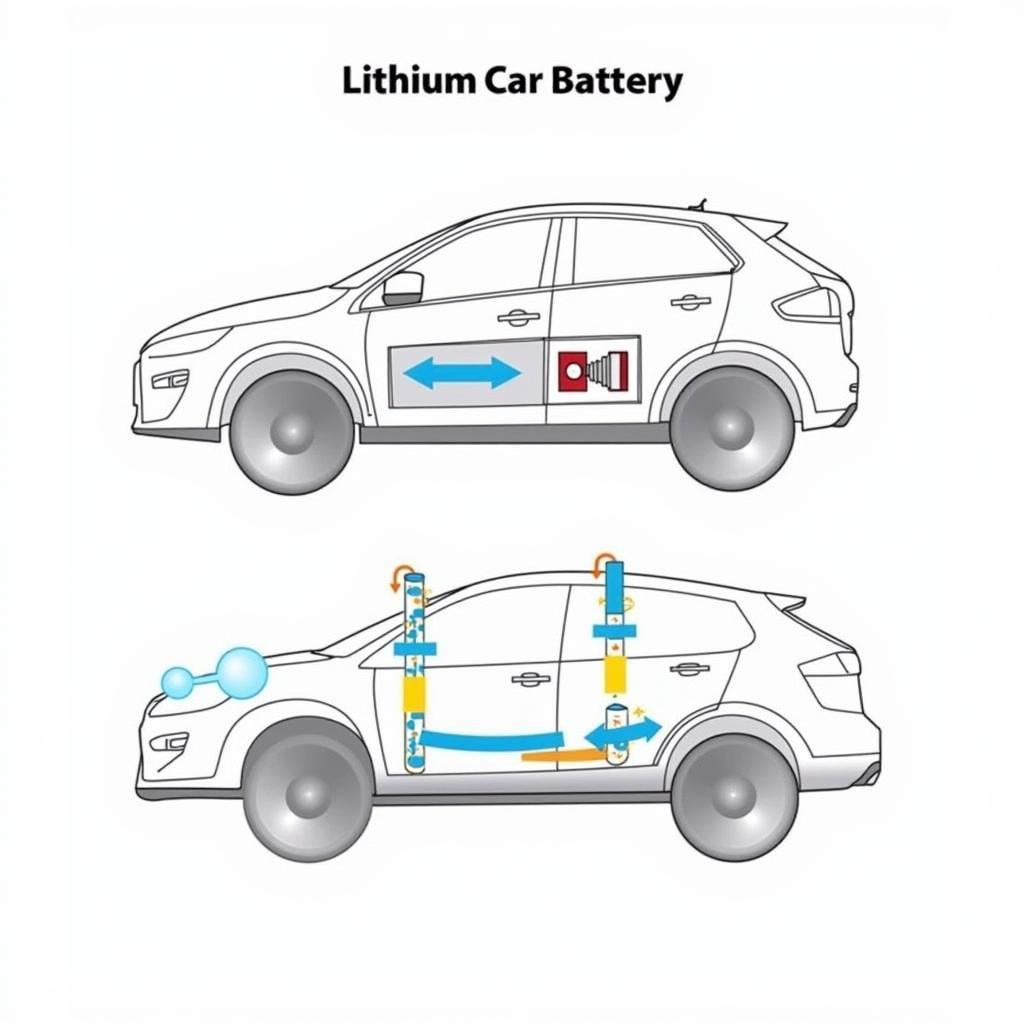Lithium car batteries are the heart of any electric vehicle (EV), powering their performance and range. As EVs become more popular, the demand for high-performance, long-lasting lithium batteries is increasing. This article will delve into the world of lithium car batteries, exploring their technology, advantages, and considerations.
Understanding Lithium Car Batteries
Lithium-ion batteries are the most common type of battery used in EVs, offering a high energy density and efficient power output. These batteries work by storing energy in lithium ions, which move between the anode and cathode when the battery is charging or discharging.
Types of Lithium Car Batteries
There are several types of lithium-ion batteries commonly used in EVs, each with unique characteristics:
- Lithium Iron Phosphate (LiFePO4): These batteries are known for their excellent safety, long life cycle, and high temperature tolerance. They are commonly used in budget-friendly EVs and have a lower energy density compared to other types.
- Lithium Nickel Manganese Cobalt Oxide (NMC): NMC batteries offer a high energy density and fast charging capabilities, making them ideal for high-performance EVs. However, they may have a shorter lifespan compared to LiFePO4 batteries.
- Lithium Nickel Cobalt Aluminum Oxide (NCA): NCA batteries boast even higher energy density than NMC batteries, making them suitable for vehicles requiring long range. They also offer fast charging and excellent performance but are more expensive and can be less durable.
Advantages of Lithium Car Batteries
Lithium car batteries offer numerous advantages over traditional lead-acid batteries, making them the preferred choice for EVs:
- Higher Energy Density: Lithium batteries store more energy in a smaller space, enabling longer driving range for EVs.
- Faster Charging: They can charge faster than lead-acid batteries, making it convenient to refuel on the go.
- Lightweight: Lithium batteries are much lighter than lead-acid batteries, improving vehicle efficiency and performance.
- Longer Lifespan: Lithium batteries can endure hundreds or even thousands of charge cycles, extending their lifespan and reducing replacement costs.
- Environmentally Friendly: Lithium batteries are free of harmful heavy metals like lead, making them a more sustainable option.
Considerations for Lithium Car Batteries
Despite their advantages, there are some important considerations for lithium car batteries:
- Cost: Lithium batteries are generally more expensive than lead-acid batteries.
- Temperature Sensitivity: Lithium batteries can perform less effectively in extreme temperatures, requiring careful temperature management.
- Disposal: Lithium batteries require specialized disposal procedures due to their chemical composition.
How to Prolong the Life of Your Lithium Car Battery
“Proper care and maintenance are key to maximizing the lifespan of a Lithium Car Battery,” says Dr. Emily Carter, a leading expert in battery technology. Here are some tips:
- Avoid Deep Discharges: Regularly charging the battery before it reaches a very low state of charge can significantly prolong its lifespan.
- Maintain Optimal Temperature: Protect the battery from extreme temperatures by parking in shaded areas during hot weather and ensuring adequate heating in cold conditions.
- Use Slow Charging: While fast charging is convenient, it can put stress on the battery. Using slow charging whenever possible can extend its life.
- Avoid Overcharging: Overcharging can damage the battery. Follow the manufacturer’s charging guidelines and ensure the battery doesn’t stay plugged in for extended periods after reaching full charge.
Frequently Asked Questions
1. How long do lithium car batteries last?
The lifespan of a lithium car battery depends on several factors, including battery type, usage patterns, and maintenance. On average, they can last between 8 and 12 years or 100,000 to 200,000 miles.
2. Can I replace a lithium car battery myself?
Replacing a lithium car battery is a complex procedure that requires specialized tools and knowledge. It is recommended to have it done by a qualified technician.
3. What happens when a lithium car battery dies?
When a lithium car battery dies, the EV will lose power and become inoperable. The battery will need to be replaced.
4. How much does a lithium car battery cost?
The cost of a lithium car battery varies depending on its size, capacity, and type. Prices can range from a few thousand dollars to tens of thousands of dollars.
5. Are lithium car batteries safe?
Lithium car batteries are generally safe, but they can pose some risks if they are not properly handled or maintained. Always follow the manufacturer’s instructions and consult a qualified technician for any concerns.
Conclusion
Lithium car batteries are a crucial component of the electric vehicle revolution, offering significant advantages over traditional battery technologies. While they come with some considerations, the benefits they provide make them an attractive option for sustainable transportation. By understanding their technology, advantages, and maintenance practices, individuals can maximize the lifespan of their lithium car batteries and enjoy the benefits of electric mobility.
 Lithium car battery technology diagram
Lithium car battery technology diagram
 EV charging station with lithium car battery
EV charging station with lithium car battery
 Mechanic inspecting lithium car battery
Mechanic inspecting lithium car battery
For any assistance, please contact us via WhatsApp: +1(641)206-8880, Email: [email protected] or visit our location: 276 Reock St, City of Orange, NJ 07050, United States. We have a 24/7 customer support team ready to assist you.

